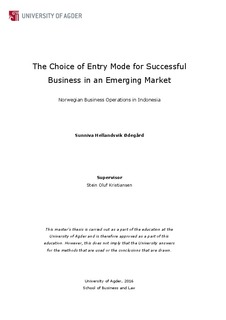| dc.description.abstract | The main topic for this master thesis is the choice of entry mode for successful business
in emerging markets, with a focus on Norwegian companies in the Indonesian market.
The problem statement of the thesis is as follows: What are the main factors affecting the
choice of entry mode for Norwegian companies in the Indonesian market?
Several studies on the choice of entry modes have previously been conducted. However,
a study of factors that impact the decision making of Norwegian companies entering the
Indonesian market have not previously been done. The main objective for this thesis was
therefore to provide a deeper insight into the establishment of Norwegian business
operations in the Indonesian market. The findings of the thesis should consequently be of
interest to Norwegian companies aspiring to establish themselves in Indonesia, as well as
for companies that already have a presence there.
The research method for the thesis is a qualitative case study, based on a sample of six
Norwegian companies currently engaged in the Indonesian market. The main sources of
data collection consisted of interviews with people in managerial positions in each
company, content analysis, and the researcher’s personal observations from time spent in
Indonesia.
One of the main findings was that local partnerships were preferred by most of the
companies, irrespective of company size, sector and international experience. A high
level of management control was also found to be important, and many of the companies
therefore preferred high-control entry modes. The majority of the companies stated a high
level of perceived cultural distance between Indonesia and Norway, and high levels of
perceived risk regarding their operations there. Corruption, lack of trust, irregular import
quotas, and a complex bureaucracy were some of the main sources of this perceived risk.
Company size and level of resource commitment also seemed to play a major role in the
choice of entry mode. Small, low resource commitment-companies often preferred more
flexible, contractual entry modes, such as exporting and licensing, while large, high
resource commitment-companies preferred direct entry modes such as joint ventures and
wholly owned subsidiaries. Additionally, Indonesian rule of law was found to have an
impact on the choice of entry mode, with special directives for foreign direct investments,
IV
differences regarding sector regulations, and rules for the acquiring of licenses and
permits.
Conclusively, the key factor for successful business in Indonesia was found to reside in
the creation of strong, personal relationships with local stakeholders and partners, basing
decisions on knowledge and understanding rather than on assumptions. | nb_NO |
